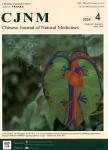Computational identification and systematic classification of novel GRAS genes in Isatis indigotica
Computational identification and systematic classification of novel GRAS genes in Isatis indigotica作者机构:Department of Pharmacy Shanghai Changzheng Hospital Second Military Medical University Department of Pharmaceutical Botany School of Pharmacy Second Military Medical University
出 版 物:《Chinese Journal of Natural Medicines》 (中国天然药物(英文版))
年 卷 期:2016年第14卷第3期
页 面:161-176页
核心收录:
学科分类:1008[医学-中药学(可授医学、理学学位)] 1006[医学-中西医结合] 100602[医学-中西医结合临床] 10[医学]
基 金:financially supported by Natural Science Foundation of China(Nos.81303160 and 81325024)
主 题:lsatis indigotica GRAS transcriptional regulators Conserved motifs Phylogenetic analysis Gene expression
摘 要:Isatis indigotica Fort., belonging to Cruciferae, is one of the most commonly used plants in traditional Chinese medicine. The accumulation of the effective components of I. indigotica is related with its growth conditions. The GRAS genes are members of a multigene family of transcriptional regulators that play a crucial role in plant growth. Although the activities of many GRAS genes have long been recognized, only in recent years were some of them identified and functionally characterized in detail. In the present study, 41 GRAS genes were identified from 1. indigotica through bioinformatics methods for the first time. They were classified into ten groups according to the classification of Arabidopsis and rice. The characterization, gene structure, conserved motifs, disordered N-terminal domains, and phylogenetic reconstruction of these GRASs were analyzed. Forty-three orthologous gene pairs were shared by I. indigotica and Arabidopsis, and interaction networks of these orthologous genes were constructed. Furthermore, gene expression patterns were investigated by analysis in methyl jasmonate (MeJA)-treated I. indigotica hairy roots based on RNA-seq data. In conclusion, this comprehensive analysis would provide rich resources for further studies of GRAS protein functions in this plant.



